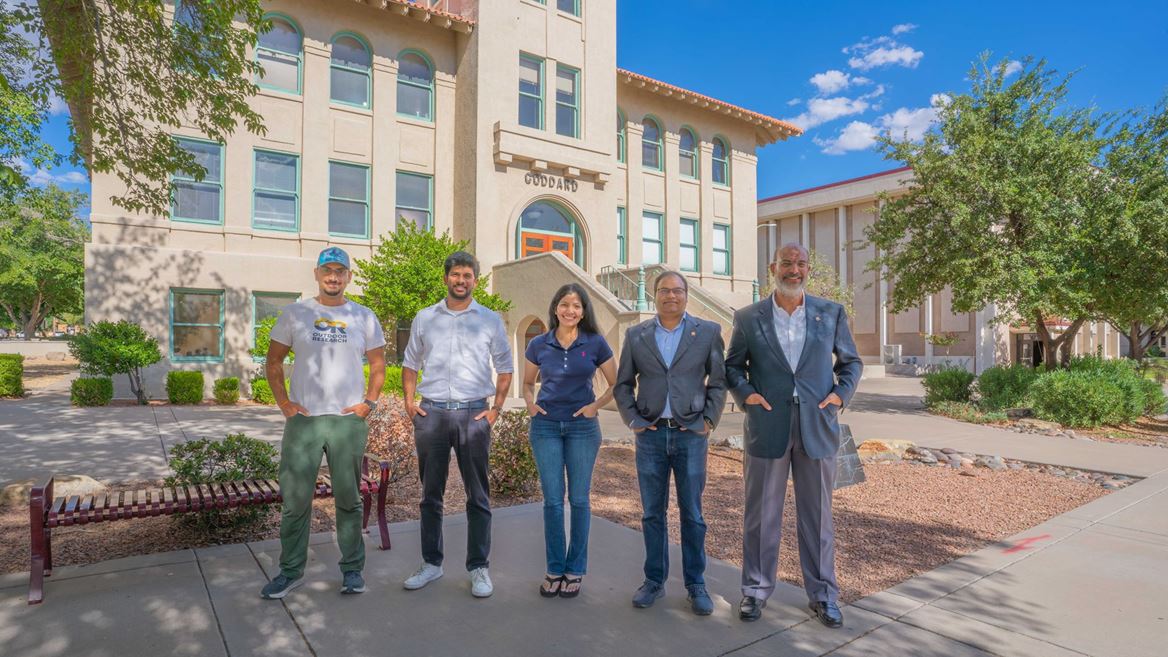A team of researchers from New Mexico State University has received a four-year, $7 million grant from the National Science Foundation. NMSU team members include Computer Science Assistant Professor Gaurav Panwar, from left, Industrial Engineering Assistant Professor Chaitanya Mahajan, Computer Science Associate Professor Roopa Vishwanathan; College of Engineering Associate Dean of Research Satyajayant “Jay” Misra; and Klipsch School of Electrical and Computer Engineering Associate Professor Hameed Badawy. (NMSU photo by Vladimir Avina)
Source: NMSU News Release
DATE: Aug. 28, 2024
WRITER: Tiffany Acosta, 575-646-3929, tfrank@nmsu.edu
New Mexico State University has received a four-year, $7 million grant from the National Science Foundation through the Established Program to Stimulate Competitive Research, or EPSCoR, Research Incubators for STEM Excellence Research Infrastructure Improvement, or E-RISE RII, to boost research competitiveness of the state of New Mexico, build partnerships across academic institutions and non-academic sectors, and create workforce development opportunities.

Satyajayant “Jay” Misra, principal investigator and associate dean of research in the College of Engineering, is leading the team that includes co-principal investigators, Roopa Vishwanathan, computer science associate professor; Suparna Chatterjee, curriculum and instruction assistant professor; Hameed Badawy, electrical and computer engineering associate professor; Chaitanya Mahajan, industrial engineering assistant professor; and Gaurav Panwar, computer science assistant professor; from NMSU, along with Marceline Masumbe Netongo from Navajo Technical University, Mihail Devetsikiotis and Xiang Sun from the University of New Mexico, and Krishna Roy from the New Mexico Institute of Mining and Technology. The project was one of five awarded by NSF.
“Making distributed additive manufacturing a reality is crucial for our state, with our population scattered in small towns and cities in a large land area. I believe it can be the greatest driver for innovation and small and medium enterprise creation, which will make economic growth inclusive across our rural and tribal populations. This project will help build a secure and trustworthy networking and cybersecurity framework that will serve as the foundation for wide adoption of distributed manufacturing not only in the state, but globally,” said Misra, who is also a computer science and electrical and computer engineering professor at NMSU.
The project, which funds the Research Center for Distributed Resilient and Emergent-Intelligence-Based Additive Manufacturing, or DREAM, will enhance New Mexico’s competitive edge in the global manufacturing sector by establishing the groundwork for an advanced distributed intelligent additive manufacturing infrastructure. It will contribute to fundamental knowledge in advanced manufacturing, cybersecurity and machine learning while contributing to small and medium enterprises-driven economic growth in New Mexico and contributing to national efforts to onshore manufacturing.
The project will provide an integrated pathway for workforce development in additive manufacturing from middle school to doctoral and postdoctoral levels by intertwining classroom activities with research experience and pedagogical models that promote diversity, inclusion and belonging.
“This investment from NSF’s E-RISE RII program powers scientific progress through broad networks of researchers, institutions and organizations that will significantly enhance STEM research capacity in our EPSCoR jurisdictions,” NSF Director Sethuraman Panchanathan said. “We are investing in a future where EPSCoR jurisdictions are even more competitive in the scientific enterprise, both nationally and internationally.”
DREAM aims to build a research center, utilizing expertise from various sectors and academic institutions spread across the state, to cultivate an advanced additive manufacturing infrastructure for New Mexico. The center will become an epicenter of expertise in intelligent distributed additive manufacturing driven by identification and redressal of architectural challenges in networking and security to enable distributed intelligent additive manufacturing. To address the challenges, the team will propose a scalable, cloud-edge continuum blueprint through software virtualization and containerization; address security and trust needs in distributed intelligent additive manufacturing by proposing frameworks to meet the needs; ensuring verifiability and auditability of distributed intelligent additive manufacturing; and building a novel distributed testbed infrastructure with a digital twin to refine networking, security and communication processes to increase the adoption of distributed intelligent additive manufacturing.
“This grant will help us lay the groundwork for New Mexico being internationally recognized as a top innovator in distributed and intelligent advanced manufacturing, led by NMSU,” Misra said.







